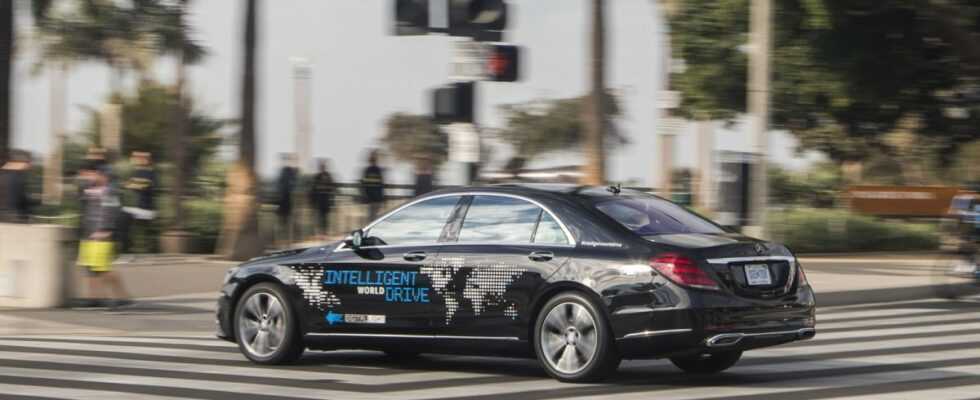The federal government is encountering resistance from manufacturers with its plan for a trustee for car data. The trustee should guarantee the car owners’ sovereignty over the wealth of data generated by their vehicles, as well as data access for authorities, insurance companies, TÜV and car repair shops.
The Association of the Automotive Industry VDA fears additional bureaucracy as well as misuse: “However, the VDA rejects the so-called trustee model for the transmission of data because we believe it has various disadvantages,” said VDA Managing Director Joachim Damasky on request.
The car data trustee has been discussed for years, largely initiated by Allianz, the largest German insurer. “For the competitively neutral use of vehicle data, we are striving for a trustee model that appropriately takes into account the access needs of users, private providers and state bodies as well as the interests of affected companies and developers,” says the coalition agreement between the SPD, Greens and FDP.
“Competition-neutral use” somewhat vague
This is not very specific, and the Federal Ministry of Transport has not yet given any details at this early stage: “We ask for your understanding that we are not yet able to provide detailed information on individual projects,” said a spokesman.
The trustee project is about a multitude of conflicting interests and open questions: from car repairs to the development of new business models. This includes the availability of car data for accident investigation as well as the question of whether car manufacturers and suppliers will be forced to share the fruits of their software development with third-party companies in the future.
Potential interested parties would be start-ups as well as large IT groups from the USA or insurance companies. “Consumers could benefit from new services as part of the digitization and networking of their cars,” says Jörg Asmussen, CEO of the insurance association GDV.

Exclusion of market participants after damages
For Allianz and the insurance industry, the first priority is unimpeded access to data after damage and accidents. “It is important that it is not a market participant,” says Christoph Lauterwasser, head of the Allianz Center for Technology (AZT), about the planned trustee. “When it comes to accident clarification or product liability, for example, the data trustee should not be an insurance company, a car manufacturer, or anyone else who is actively involved in these issues, but a neutral body.”
The insurance association demands that its member companies have the right to access car data, but has not committed itself to a specific model. “Data from networked cars does not belong to the manufacturers,” it belongs in the hands of the owners, emphasizes GDV CEO Asmussen.
Mobility Data Act for non-competitive use
“They must be able to freely decide to whom they transmit vehicle data.” A mobility data law should make this competition-neutral use possible. Whether such competition-neutral access to the data takes place via a trustee model or in some other way is of secondary importance.”
Lauterwasser also emphasizes that it is very important to Allianz that the user is given control over the data. “That would also be completely sufficient for us as an insurance company, since we could then also receive the necessary vehicle data for accident investigation via the customer’s obligation to cooperate in the claims settlement.”
Clarification of these issues is urgently needed, says the Allianz security expert. “The first vehicles with automated driving functions are currently being approved by Mercedes.” Other manufacturers would follow.

European solution on type approval recommended
“This raises the question of where exactly is the driving mode data stored and how can the customer access it?” There is no regulation for this yet. “In this respect, from our point of view, this should be tackled now,” said Lauterwasser. From Allianz’s point of view, a European solution via the type approval of vehicles would be recommended for implementation.
The automotive industry is basically ready to share the data generated in the vehicle, emphasizes VDA Managing Director Damasky. “We want to make the vehicle data accessible to third parties, but at the same time ensure that it cannot be manipulated during transmission.”

Auto industry proposes its own “Trust Center”.
The manufacturers’ counter-proposal amounts to leaving car data in the care of the industry and setting up a “trust center” to guarantee its integrity. “In other words, a facility that certifies data quality,” explained Damasky. The proposal is called Adaxo, short for Automotive Data Access-Extended and Open.
From the point of view of the manufacturers, the vehicle owners should give their consent to the third-party use of the vehicle data. “We believe that a trustee model dilutes data sharing and is not user-friendly. For this reason, we advocate for the query from a single source, via the vehicle manufacturer’s backends.” In IT terms, the backend refers to the parts of a computer system that are invisible to the user, i.e. the server and other infrastructure.
Another point: “The release must be earmarked,” says Damasky. From the manufacturer’s point of view, not every interested party should have unlimited access to car data from the outset. It sounds different at Allianz: “Independent third parties” should also be able to offer services “without the vehicle manufacturer acting as a gatekeeper,” said AZT manager Lauterwasser.
(fpi)
